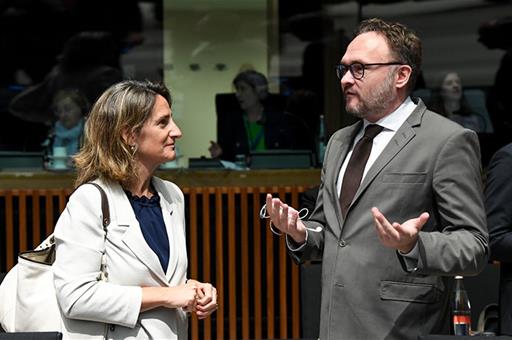At the Luxembourg Energy Council
Spain is satisfied with an agreement that closes the Renewables and Energy Efficiency Directives and accelerates energy transition
News - 2022.6.27
"Accelerating the energy transition, showing greater ambition on all fronts, will give a boost to our energy independence, the strengthening of our industry, knowledge creation and economic growth," said Teresa Ribera, Vice-President of the Government of Spain and Minister for Ecological Transition and Demographic Challenge.
The European Energy Council finalised the general approach agreement on the amendments to the Energy Efficiency Directive and the Renewables Directive, notably including Europe's increased ambition, with new, more demanding targets for 2030 in both legal texts. The next milestone will be the trialogues with the European Parliament.
Regarding the modification of the Energy Efficiency Directive, the vice-president announced that "Spain supports and considers that the furthered ambition as set out in the REPowerEU package is fully justified, especially in this sensitive and complicated context", which raises the target for 2030 from a reduction of 9% to 13%.
Ribera has proposed that to calculate the national contributions linked to the new efficiency objectives, the climate and energy plans of the member states considered sufficient by the European Commission itself, such as Spain's, should be taken into consideration. She also supported the need for the public sector to show leadership, calling for modulation of the effect of obligations on small municipalities, which are less able to adapt. She supported the prioritisation of renewable energies in heating and cooling systems, "avoiding the proliferation of new infrastructures that would depend on and prolong our dependence on fossil fuels in the medium and long terms".
She also supported raising the renewable energy target to 40% of EU energy consumption by 2030 as "the way to ensure indigenous, affordable and secure systems that protect consumers"; and she proposed supporting non-renewable technologies in the regulatory framework: "Renewable energy is one thing, low carbon is another, and this is a renewables directive", she reiterated.
Ribera raised the issue of the difficulty of including international maritime bunkering in the target for renewables in the transport sector, calling for an adjustment to ensure environmental, climate and energy consistency to avoid carbon leakage and imported deforestation. She proposed granting more flexibility on a transitional basis to facilitate the initial development of the first renewable hydrogen projects, which are key to breaking Russia's dependence. With regard to the incorporation of renewables in buildings, she indicated that "the objective should be based on a calculation methodology that takes into account electricity from self-consumption in the same building, as well as from other renewable sources".
Overcoming the energy crisis
Regarding European plans to overcome the energy crisis caused by the war in Ukraine and aggravated by reductions in Russian energy supplies to the EU, the vice-president defended European plans: "The European Commission's REPowerEU Plan charts the right path to drastically reduce dependence on imported fossil fuels from Russia".
Ribera pointed out that European countries must be prepared for a total cut in Russian gas supplies and called for the joint gas purchasing platform to be activated as soon as possible, while stressing that "only joint and coordinated action by all EU countries will allow us to face the forthcoming challenges in terms of guaranteeing supply".
The Vice-President of the Government of Spain underlined that interconnections between the Iberian Peninsula and the rest of the EU should be prioritised, so that these interconnections allow Spain to increase its exports of renewable electricity. She also stressed that Spain is prepared to participate decisively in the contingency plans that are established, which must guarantee fair and equal treatment for all countries, taking into account the efforts made to diversify supplies and the level of physical interconnection with other countries.
Ribera also thanked the Commission for activating the debate on adapting the current electricity market design to minimise the impact of electricity prices. In this respect, she stressed the need for exceptional responses to an exceptional situation, proposing coordinated, efficient and citizen-friendly responses.
Energy Charter Treaty
Last, the Council addressed the outcome of the 14 rounds held by the signatories of the Energy Charter Treaty to modernise it, with a view to aligning it with the objectives of the Paris Agreement and the European Green Pact, which the Vice-President of the Government of Spain described as "disappointing": "The modernised Treaty will continue to hamper climate policy ambition, protect fossil investments and call into question the EU and member states' right to regulate.
This is why I believe the time has come to ask the legal services of the Commission and the Council for a legal analysis of the possible effects of withdrawal from the Treaty", she said, before adding that "we must prepare the coordinated exit of the EU and its members from the Treaty in view of the Conference in Mongolia in November".
Non official translation





